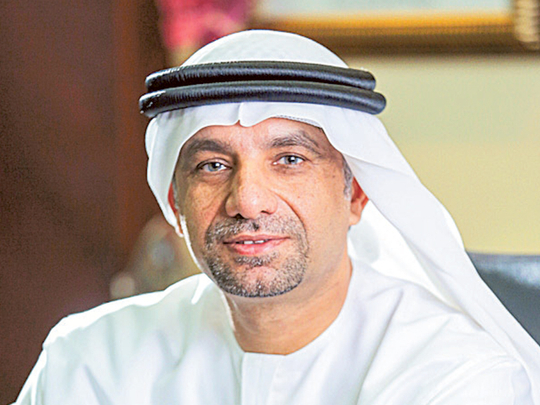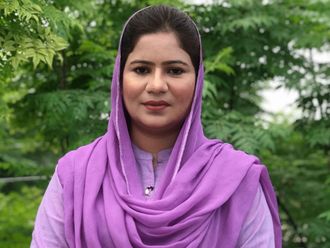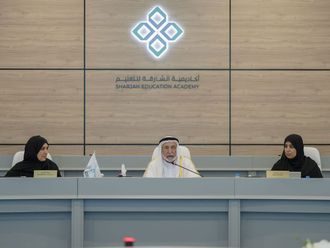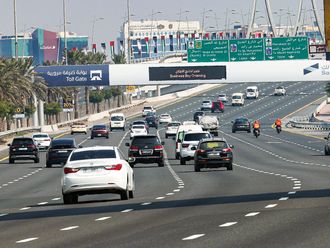
Abu Dhabi: Universities in Abu Dhabi have begun to encourage and produce cutting-edge research. In an effort to promote this trend, the Abu Dhabi Education Council (Adec), the emirate’s education sector regulator, last year handed out 30 research awards for the first time. In an exclusive interview with Gulf News, Dr Mohammad Baniyas, executive director for higher education at Adec, said that it is this focus on research that will foster a knowledge-based economy for the emirate. He also shed light on the future of higher education in Abu Dhabi.
How is the landscape for higher education changing in the emirate?
Higher education, through the quality of programmes offered and the innovations developed, must serve the nation. In this regard, we are seeing a greater number of universities prioritise faculty-led research, and we consider this to be an extremely positive trend. Many are also focussing on areas that support the emirate’s development or help solve current challenges, including aerospace technology, water access, health care and renewable energies. This is why the research awards were handed out last year as part of the Year of Innovation, and we are now looking into whether they should be made into a regular feature.
Some of the most interesting projects this time around were centred upon the applications of 3D printing, the integration of special needs individuals, obesity management, cancer treatment and diagnosis and geological risk measurement.
The emirate currently has 29 universities. What is the trend in student enrolment at these institutions and can we expect any new universities to open their doors in the near future?
In the 2014-15 academic year, we had 52,450 students studying at Abu Dhabi universities, which include three federal institutions, 12 public institutions, 10 private institutions and four partner institutions (such as New York University Abu Dhabi and Paris Sorbonne University in Abu Dhabi). Enrolment grew by about 9.8 per cent from the previous academic year. We also had a greater number of female students at 33,097, compared to 19,353 male students.
In the near future, we are expecting Egypt’s Al Azhar University (which specializes in Sunni Islamic learning) to open a campus in Al Ain.
Adec now requires universities to get their programmes approved, in addition to approvals from the UAE Ministry of Higher Education and Scientific Research (MoHESR)). Could you explain why this new step has been introduced?
Adec prioritises student employability and progress, as this development in human capital is what will support Abu Dhabi’s future. The new approval process, which has been implemented since November 2015, ensures that the programmes which are made available are indeed relevant to Abu Dhabi’s future economy, and align with our strategic growth plans. It is not meant to add to university regulations.
To make procedures simple, universities and colleges submit their programmes to the Adec when setting up a new degree or renewing their MoHESR licences every five years. The approval takes just about six weeks to come through. In this manner, we make sure that universities focus on offering programmes that will produce graduates employable in Abu Dhabi.
How does Adec check on graduate employability? Which are the fields in which the emirate requires more young graduates?
For the past two years, Adec has surveyed graduates nine months after they had finished their degrees to ascertain what career or educational path they had chosen. This Graduate Destination Survey most recently polled 6,487 graduates in May 2015, and the results showed that 65 per cent of Emirati and expatriate graduates were already working, up from 61 per cent the previous year.
As of now, Abu Dhabi requires more graduates in Engineering, including in the disciplines of mechanical, electrical, safety and petroleum engineering, as well as in Medicine, the Applied Humanities like social work and counselling, and Business Management with a focus on finance and accounting.
In what way is the Adec working to ensure that graduates can keep up with their peers in the competitive international market?
Adec has always encouraged universities to apply for international accreditation for their programmes. For example, engineering degrees are encouraged to meet standards set by renowned bodies like the Accreditation Board for Engineering and Technology. In this way, graduates are assured that their degrees meet international quality benchmarks.
In addition, the Adec is also providing scholarships to meritorious Emirati students. While most of them opt for programmes in the US and Britain, a handful now also look for top-notch universities in the Far East, including those in Tokyo and Singapore that are focused on technology and innovation. These Emirati graduates then return to the UAE armed with international experiences and familiarity with other cultures and languages, enabling them to complete internationally.












